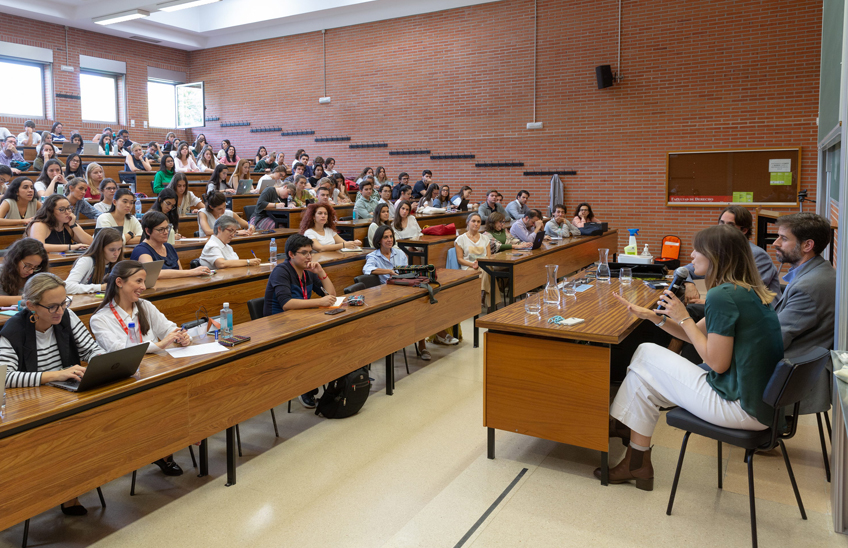Luis Ángel Díaz Robredo, psychologist: "One of the unrealistic fears during an anxiety attack is the feeling of being able to die at that moment".
Keys, symptoms and how to cope with anxiety, topics of a colloquium held at the University.

PhotoManuelCastells/
21 | 10 | 2022
How is stress different from anxiety? What are the symptoms and how can an anxiety attack be prevented? These were some of the key issues addressed at a roundtable held at the University of Navarra on this emotion that more and more young people suffer nowadays.
"One of the unrealistic fears a person suffers during an anxiety attack is the feeling that he or she may die at that moment. Although there is a feeling of drowning and tachycardia, these episodes do not produce cardiac and respiratory problems". This was stated by Luis Ángel Díaz Robredo, psychologist and professor of the School from Education and Psychology. Cristina Vidal, clinical psychologist at the department of Psychiatry and Clinical Psychology of the University of California at La Salle, explained that this Clínica Universidad de NavarraShe explained that this subject of attacks usually last "about 10 minutes" and stressed the importance of knowing that "although it is a very unpleasant peak", it is important to remember that this state "is not dangerous" and that it always subsides.
Anxiety, according to experts, is mainly related to fear. "When one is sample anxious it is usually because there is some status that is not right, we have tension and the body prepares to face a possible danger. This anxiety is the fear maintained over time that something dangerous is going to happen", explained Cristina Vidal.
The experts talked about the symptoms, factors and keys to prevent anxiety. Among the latter, they emphasized maintaining healthy habits or planning to foresee situations that can generate tension. With regard to the factors that promote anxiety, they pointed out the lack of sleep, excessive consumption of stimulating substances, as well as the lack of sport and a good diet.
Feeling anxiety is not the same as feeling stress, but there is a relationship. Díaz Robredo explained that stress has a positive mechanism because "it activates you and prepares you to do something"; anxiety, on the contrary, generates a slight discomfort, in those milder cases; or it can become something more serious, experiencing a greater uneasiness.
The experts stressed that all people will experience anxiety at some point in their lives "without it being pathological". According to them, today's society rejects the idea of discomfort, generating and sending messages about "how to achieve happiness". Ideas and phrases such as "you don't have to worry about this or that" exert pressure on people and do not financial aid diminish the feeling of anxiety. "The idea that you have to eradicate anxiety is wrong. We are going to feel it and we have to work on it in order not to develop a disorder," concluded Vidal.
One of the keys, experts point out, to know when anxiety can be pathological and require professional financial aid is the limitation it produces in our day to day life. "When we can no longer continue with our activities and routines due to the frequency and intensity of anxiety".
This colloquium, moderated by Gonzalo Arrondo, psychologist and researcher of the group Mind-Brain of Institute for Culture and Societyis part of project Health and Well-being, one of the initiatives within the 'Education transforming' axis that the University of Navarra has launched as part of its 2025 strategy.
Symptoms, factors of anxiety and keys to its prevention
Keys to prevent episodes or situations that generate anxiety:
-
Healthy habits: Maintain a healthy diet, eliminate the consumption of toxic substances, develop social relationships and leisure activities that make us feel good, and have a daily rest at 7-8 hours.
-
Plan and have an overview. For example, analyze what situations I have to face in this week/month that generate more stress. Plan when they will occur and promote more self-care strategies: food, time for leisure activities, sports... Try to 'stop' to disconnect the head and start again.
Some symptoms of anxiety:
-
Excessive sweating
-
Catastrophic thoughts
-
Feeling of internal tension
-
Physical and mental restlessness
-
Excessive preoccupation with day-to-day issues
-
Tachycardia
-
Chest tightness
-
Headaches
-
Difficulty falling or staying asleep or feeling unrefreshed upon awakening
Some modifiable factors that promote anxiety:
-
Lack of sleep. Sleeping less than 5 hours "weakens you", makes it more difficult to face the next day: we have less physical, psychological and emotional capacity, and makes any status produce an important emotional reaction. The core topic is to ensure a good night's rest.
-
Excessive consumption of stimulating substances such as coffee.
-
Sedentary life
-
An unhealthy or unbalanced diet.
-
Being in continually stressful social environments or having inadequate social relationships




